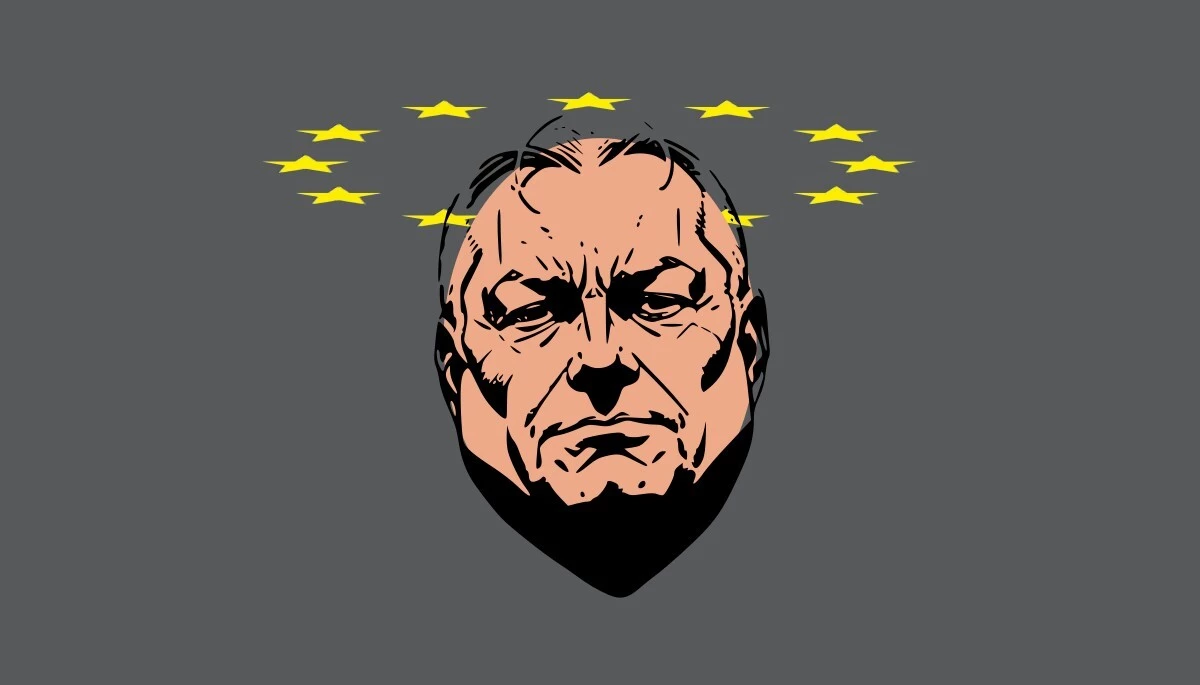Reactions of the pro-Russian segment of Telegram channels to the extension of the EU anti-Russian sanctions until July 31, 2025.
Українською читайте тут.
On January 31, 2025, the EU sanctions against Russia would expire. They are renewed every six months, and this requires the unanimous support of the 27 member states. This time, the EU risked missing the deadline for extending sanctions against Russia because of Hungarian Prime Minister Viktor Orbán's refusal to sign the relevant document. On January 21, Orbán criticized the EU's sanctions regime, which had “destroyed the competitiveness of the European economy,” and said that “it's time for change.” On January 24, the EU ambassadors failed to agree on the extension of European sanctions against Russia at a meeting in Brussels, a decision blocked by Hungary. However, on January 27, after Hungary withdrew its objections, the EU did extend restrictive measures against Russia, as reported by EU chief diplomat Kaja Kallas on her page on the social network X.
Here is how the pro-Russian segment of Telegram channels and Russian propagandists reacted to the extension of European anti-Russian sanctions and Hungary's decision. “Detector Media” analyzed 693 messages that appeared on January 21-28 and contained a combination of keywords such as “sanctions,” “EU,” “Orbán,” “Hungary,” “Russia,” and others. The information was provided by Semantrum company.
“Hungary has pulled a tricky bargain”
Hungarian Prime Minister Viktor Orbán continued to block sanctions against Russia to the last, demanding that the EU pressure Ukraine to continue the transit of Russian gas, which was stopped on January 1, 2025. In addition, he insisted that Ukraine must stop “attacking” the “Turkish Stream” and ensure that it does not stop oil transit.
Ukrainian citizen and pro-Russian propagandist Dmytro Vasylets called Orbán's actions hypocritical towards Russia, as he allegedly always says one thing and does another.
“So, as soon as Hungary stopped earning hundreds of millions on the resale of Russian gas, suddenly Prime Minister Orbán decided not to support anti-Russian sanctions! Prior to that, Orbán had been voting in support of anti-Russian sanctions for THREE YEARS, while maintaining 'pro-Russian rhetoric' and actually making anti-Russian decisions,” Vasylets wrote on his Telegram channel with an audience of almost 470,000 subscribers.
In early 2024, the Security Service of Ukraine served Vasylets with a notice of suspicion of justifying Russia's armed aggression and calling for a violent change in the constitutional order and the seizure of state power in Ukraine.
Budapest's position has drawn criticism from other EU states. In particular, the Prime Minister of Poland, who currently holds the EU presidency, Donald Tusk, wrote on his page on the social network X that if Orbán vetoes the extension of sanctions by the EU, “it’ll be absolutely clear that in this big game for the security and future of Europe, he is playing in Putin’s team, not in ours, with all the consequences of this fact.” A pro-Russian Telegram channel with more than 530,000 subscribers reacted to Tusk's words by calling him “the jackal of Europe.” Hungarian Foreign Minister Péter Szijjártó also responded to Tusk's words, calling him a “Soros agent” and noting that the Hungarian government is actually “playing for the Hungarian national team.” A few days earlier, Szijjártó had said that Hungary would consult with the United States on extending European sanctions against Russia.
After US President-elect Donald Trump threatened Russia with sanctions and tariffs on all exports to the US if it rejected the peace agreement with Ukraine, and, according to Szijjártó, the European Commission committed itself to protect gas and oil pipelines leading to the EU member states, Hungary agreed not to block the extension of the EU sanctions against Russia. A Russian propaganda Telegram channel with 104,000 subscribers wrote that “Hungary has pulled a tricky bargain,” meaning that it received the desired guarantees from the EC.
Political strategist Mykhailo Chaplyha, who was included in the register of traitors of the “Chesno” movement for justifying Russia's armed aggression against Ukraine, wrote on his Telegram channel with 131,000 subscribers that “Hungary has 'deflated' once again,” hinting at the weakness and naivety of Hungarians:
“Ugh… all this happened BEFORE… ))) And the “Turkish Stream”, and the condemnation of the attacks on it, and oil transit… But the hamsters are eating it up… Well, okay…”
“It would seem that this is a small victory for the 'Russophobes', although it depends on how you look at it”
The propagandists' reactions to the EU's decision to renew sanctions against Russia on January 27, led to the conclusion that these restrictions were actually harming Europe itself more than Russia. In particular, a Russian propaganda anonymous Telegram channel with 423,000 subscribers wrote:
“It would seem that this is a small victory for the Russophobes, although it depends on how you look at it – the 'effectiveness' of sanctions has already been well proven by the brisk destruction of the European economy, so let them continue to cut the branches they are sitting on. Who are we to forbid them.”
A number of similar posts suggested that European sanctions against Russia are actually only for the benefit of the Americans.
“The sanctions that were supposed to hit the raw materials sector of Russia's economy did not work, they became boomerangs that closed the sky over Europe. To the delight of American capital, which is making the most of this situation, as Europe has dramatically lost its competitiveness in global markets,” the pro-Russian Telegram channel with 131,000 subscribers wrote.
Ukrainian MP Oleksandr Dubinskyi, accused of treason, wrote on his Telegram channel:
“This will further widen the gap between the economic potentials of the EU and the US and the rest of the world. Sanctions against Russia are obviously not beneficial to the EU and have only a narrow political aspect,” his post received 45,000 views.
Senior Kremlin officials, such as Russian President's spokesman Dmitry Peskov, also reacted to the renewal of the EU anti-Russian sanctions. He said that “the EU's extension of illegal sanctions against Russia does not change anything, they are contrary to international law.” His words were spread in propaganda Telegram channels. It is telling that the sanctions allegedly contradict international law, while Russia's invasion of Ukraine does not.
At the same time, Russia is likely to start seizing foreign assets in response to sanctions against it in the near future. Such changes are planned to be introduced in Russian legislation – the text has already been agreed upon with the Central Bank of Russia, the Ministry of Finance, the Ministry of Economy, and the Ministry of Foreign Affairs. A post on a Russian propaganda Telegram channel, which received 25,000 views, says that “unfriendly states” can be punished in this way if they are involved in freezing Russian funds abroad:
“It seems that the Russian Federation is thus implementing a policy of deterring unfriendly countries from unfair use of frozen assets (in fact, any action other than unfreezing will be unfair).”
“In such conditions, sometimes even catching a cold is deadly…”
No matter how much the propagandists deny it, the Russian economy and Russians are suffering from the sanctions. Julian Hinz, a German economist, and professor at the University of Bielefeld and the Institute of International Economics in Kiel, believes that the statistics of alleged economic growth published by the Russian authorities cannot be trusted. In his opinion, they give a picture of a developed economy, but at the same time, problems are growing that often cannot be reflected in standard statistics.
For example, Russia is experiencing a shortage of many imported medicines as a result of sanctions, and Russians are forced to buy medicines on the black market. The Russian Telegram channel with 236,000 subscribers writes:
“According to official statistics, by the way, the domestic pharmaceutical industry is doing great, and the number of medicines produced in Russia is only growing, import substitution is working. In practice, however, sometimes a simple saline solution disappears, and sometimes a simple Russian-made laxative becomes the leader in price increases among all goods in the country. In such conditions, sometimes even catching a cold is deadly…”
Following the extension of the EU sanctions against Russia, EU chief diplomat Kaja Kallas said that Sony's PlayStation and Microsoft's Xbox would be included in the 16th package of sanctions against Russia. This package is planned to be adopted on February 22, two days before the third anniversary of Russia's full-scale invasion of Ukraine. This means that their legal sale will be banned in Russia. According to Kallas, Russians even use video game consoles to control drones.
Reacting to this, a Russian propaganda Telegram channel with 563,000 subscribers spread the words of Dmitry Shatunov, a member of the LDPR central office, who called for “slapping the hands of those who have the audacity to show aggression against Russian children,” referring to the European diplomats:
“Taking revenge on Russian children is despicable. Obviously, game consoles have nothing to do with drones. Although, judging by the desire to ban the Russian song 'Sigma Boy,' there is little to be surprised about. The West is attacking the sacred – our children, and this is too much, this is absolutely fascist tactics.”
Russian propagandist Ruslan Ostashko expressed a different opinion on the possible ban on the legal sale of game consoles in Russia. In his personal Telegram channel, in a post that has received almost 100,000 views, he wrote:
“Perhaps the point is different – the West understands that drones are best operated by gamers, so they are recruited to fly drones, including in Ukraine. Or is this just another spoke in the wheels of our cyber athletes?”
On January 29, it became known that the EU would not impose a complete ban on imports of liquefied natural gas (LNG) from Russia in the 16th package of sanctions. Despite the fact that in December 2024, 10 EU states, including Finland, Poland, and the Baltic states, called on the European Commission to “ban imports of Russian gas and LNG as soon as possible.” Belgian Prime Minister Alexander De Croo also said that sanctions against Russia should be expanded to include Russian natural gas, LNG, and fertilizers. And to ensure a stable future, these should be long-term sanctions, the Belgian prime minister concluded. These words outraged propagandists, and one of the pro-Russian Telegram channels with 119,000 subscribers wrote:
“And after the war, why do you need them [sanctions], you freak? Or does the NATO block no longer guarantee you 'protection' from Russia? Is this how you talk to such idiots? And if he was the only one in Europe, but they are worse than one another.”
Hungary has repeatedly blocked EU decisions but eventually backed down. The same happened in the case of the renewal of the EU sanctions against Russia. The propagandists who had pinned their hopes on Orbán and his team were disappointed. And when the EU finally made the decision, they changed their rhetoric both about Hungary and about the renewal of the sanctions. They started to use excuses, saying that sanctions are not a sentence for Russia and that Europe will pay the price for them. However, after all, sanctions are an effective tool to combat Russia. The task of the Europeans and the rest of the civilized world is to further strengthen the restrictions and make it impossible for Russia to circumvent them. And the propagandists, in turn, will continue to do their job anyway: to tell us, as they have been doing for three years in a row, that sanctions do not work. Or that they only harm those who impose them.
The collage on the main page was created by Oleksii Pivtorak



